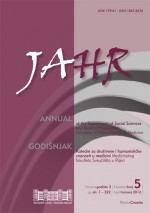Utjecaj religijskog statusa i kvalitete života na konzumaciju alkohola među studentskom populacijom Sveučilišta u Tuzli
Abstract
Introduction: Alcoholism is one of the most pressing problems of modern civilization, and thus stands out as a problem among the students population. Quality of life is most fre-quently assessed in the physical, spiritual, material and environmental welfare. Religiosity has always been part of the value of human life.objective of the Paper: To reasrch alcoholic status, satisfaction with the quality of life and religi-osity of students at the University of Tuzla. At the basis of the latter elements is to assess whether there is a correlation between the level of alcohol consumption, quality of life and religious status.Examinees and methods: Resrche was made in 2010 among the students of third and fourth year of the mayority faculties at the University of Tuzla. Two cinds of questionnaires were used: WHOQOL-BREF Quality of Life Questionnaire WHO and the questionnaire for religiosity (adapted for the Federation of Bosnia and Herzegowina, based on questionnaire from: Mar-tin Rieger, Karin Bawidamann, Matthias Jäger, Religionsmonitor, 2008, Bertelsmann Stiftung, Gütersloh, 2008) and the question about the alcoholic status. For data processing were used Kruskall Wallis test and ANOVA with statistical significance between the variable p <0.05.Results: 517 students were tested, of whom 41 % were male and 59 % women. Among the student population alcohol consumed on the daily basis 0.77 %, a few times during a week 5.4 %, a few times during a month 20.9 %, 35.2 % rarely, and 37.7 % never tested. The overall quality of life through the domain of mental and physical health and the environ-ment domain in relation to different levels of alcohol consumption showed no statistically significant difference. On the other side in the domain of social relationships was statistically significant at p <0.005. Different habits of alcohol consumption and all domains of religious status (ideological, experiential, ritualistic, intellectual, and consequential domain) showed highly statistical significant difference at p < 0.0001Conclusion: More than 62 % of the student population consumes alcohol. Religious stu-dents significantly don’t drink alcohol. Quality of life apart from its social domain does not affect to the level of alcohol consumption.
Downloads
Published
Issue
Section
License
Authors who publish with this journal agree to the following terms:
- Authors retain copyright and grant the journal right of first publication with the work simultaneously licensed under a Creative Commons Attribution License that allows others to share the work with an acknowledgement of the work's authorship and initial publication in this journal.
- Authors are able to enter into separate, additional contractual arrangements for the non-exclusive distribution of the journal's published version of the work (e.g., post it to an institutional repository or publish it in a book), with an acknowledgement of its initial publication in this journal.
- Authors are permitted and encouraged to post their work online (e.g., in institutional repositories or on their website) prior to and during the submission process, as it can lead to productive exchanges, as well as earlier and greater citation of published work (See The Effect of Open Access).



